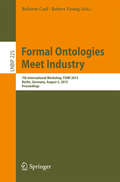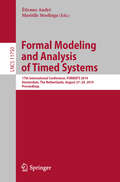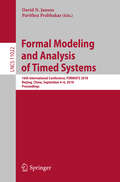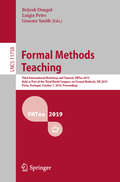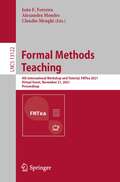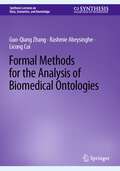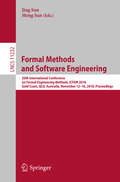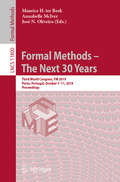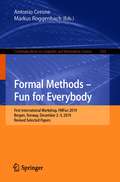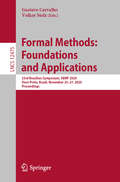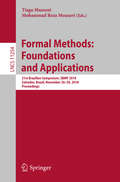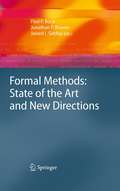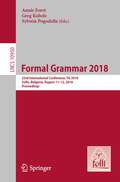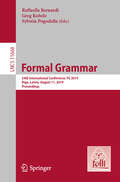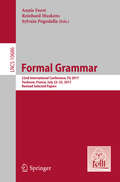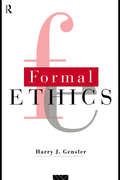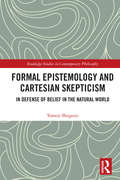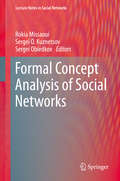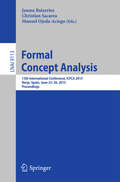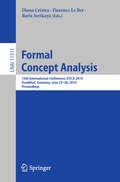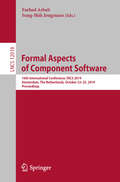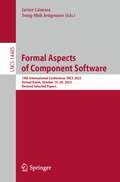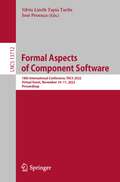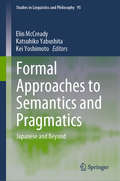- Table View
- List View
Formal Ontologies Meet Industry
by Roberta Cuel Robert YoungThis book constitutes the proceedings of the 7th International Formal Ontologies Meet Industries Workshop held in Berlin, Germany, in August 2015. The 11 full research papers accepted for FOMI 2015 were selected from 18 submissions. The papers focus on theoretical studies of formal ontologies committed to provide a sound basis for industrial applications and to allow formal representation of corporate knowledge, and on business experiences in case studies that single out concrete problems and possible solutions in the creation and deployment of formal ontologies. Overall, they provide valuable insights into the current state of progress in supporting industrial information and knowledge sharing through the development of formal ontologies.
Formal Modeling and Analysis of Timed Systems: 17th International Conference, FORMATS 2019, Amsterdam, The Netherlands, August 27–29, 2019, Proceedings (Lecture Notes in Computer Science #11750)
by Étienne André Mariëlle StoelingaThis book constitutes the refereed proceedings of the 17th International Conference on Formal Modeling and Analysis of Timed Systems, FORMATS 2019, held in Amsterdam, The Netherlands, in August 2019.The 15 full papers and 2 short papers presented in this volume were carefully reviewed and selected from 42 submissions. The papers are organized in the following topical sections: special session on data-driven and stochastic approaches to real-time, including monitoring and Big Data; timed systems; linear and non-linear systems; timed automata; special session on timed systems and probabilities.
Formal Modeling and Analysis of Timed Systems: 16th International Conference, FORMATS 2018, Beijing, China, September 4–6, 2018, Proceedings (Lecture Notes in Computer Science #11022)
by David N. Jansen Pavithra PrabhakarThis book constitutes the refereed proceedings of the 16th International Conference on Formal Modeling and Analysis of Timed Systems, FORMATS 2018, held in Beijing, China, in September 2018. The 14 papers presented in this volume were carefully reviewed and selected from 29 submissions. The papers are organized in the following topical sections: invited papers, temporal logics, distributed timed systems, behavioral equivalences, timed words, and continuous dynamical systems. The aim of FORMATS is to promote the study of fundamental and practical aspects of timed systems, and to bring together researchers from different disciplines that share interests in modeling and analysis of timed systems and, as a generalization, hybrid systems.
Formal Methods Teaching: Third International Workshop and Tutorial, FMTea 2019, Held as Part of the Third World Congress on Formal Methods, FM 2019, Porto, Portugal, October 7, 2019, Proceedings (Lecture Notes in Computer Science #11758)
by Brijesh Dongol Luigia Petre Graeme SmithThis book constitutes the refereed proceedings of the Third International Workshop and Tutorial, FMTea 2019, Held as Part of the Third World Congress on Formal Methods, FM 2019, Porto, Portugal, October 2019. The 14 full papers presented together with 3 abstract papers were carefully reviewed and selected from 22 submissions. The papers are organized in topical sections named: Tutorial lectures; Teaching Program Verification; Teaching Program Development; and Effective Teaching Techniques.
Formal Methods Teaching: 4th International Workshop and Tutorial, FMTea 2021, Virtual Event, November 21, 2021, Proceedings (Lecture Notes in Computer Science #13122)
by João F. Ferreira Alexandra Mendes Claudio MenghiThis book constitutes the refereed proceedings of the 4th International Workshop and Tutorial, FMTea 2021, Held as Part of the 4th World Congress on Formal Methods, FM 2021, as a virtual event in November 2021. The 8 full papers presented together with 2 short papers were carefully reviewed and selected from 12 submissions. The papers are organized in topical sections named: experiences and proposals related with online FM learning and teaching, integrating/embedding FM teaching/thinking within other computer science courses, teaching FM for industry, and innovative learning and teaching methods for FM.
Formal Methods for the Analysis of Biomedical Ontologies (Synthesis Lectures on Data, Semantics, and Knowledge)
by Guo-Qiang Zhang Rashmie Abeysinghe Licong CuiThe book synthesizes research on the analysis of biomedical ontologies using formal concept analysis, including through auditing, curation, and enhancement. As the evolution of biomedical ontologies almost inevitably involves manual work, formal methods are a particularly useful tool for ontological engineering and practice, particularly in uncovering unexpected "bugs" and content materials. The book first introduces simple but formalized strategies for discovering undesired and incoherent patterns in ontologies before exploring the application of formal concept analysis for semantic completeness. The book then turns to formal concept analysis, a classical approach used in the mathematical treatment of orders and lattices, as an ontological engineering principle, focusing on the structural property of ontologies with respect to its conformation to lattice or not (non-lattice). The book helpfully covers the development of more efficient algorithms for non-lattice detection and extraction required by exhaustive lattice/non-lattice analysis. The book goes on to highlight the power and utility of uncovering non-lattice structure for debugging ontologies and describes methods that leverage the linguistic information in concept names (labels) for ontological analysis. It also addresses visualization and performance evaluation issues before closing with an overview and forward-looking perspectives on the field. This book is intended for graduate students and researchers interested in biomedical ontologies and their applications. It can be a useful supplement for courses on knowledge representation and engineering and also provide readers with a reference for related scientific publications and literature to assist in identifying potential research topics. All mathematical concepts and notations used in this book can be found in standard discrete mathematics textbooks, and the appendix at the end of the book provides a list of key ontological resources, as well as annotated non-lattice and lattice examples that were discovered using the authors' methods, demonstrating how "bugs are fixed" by converting non-lattices to lattices with minimal edit changes.
Formal Methods and Software Engineering: 20th International Conference on Formal Engineering Methods, ICFEM 2018, Gold Coast, QLD, Australia, November 12-16, 2018, Proceedings (Lecture Notes in Computer Science #11232)
by Jing Sun Meng SunThis book constitutes the refereed proceedings of the 20th International Conference on Formal Engineering Methods, ICFEM 2018, held in Gold Coast, QLD, Australia, in November 2018. The 22 revised full papers presented together with 14 short papers were carefully reviewed and selected from 66 submissions. The conference focuses on all areas related to formal engineering methods, such as verification; network systems; type theory; theorem proving; logic and semantics; refinement and transition systems; and emerging applications of formal methods.
Formal Methods – The Next 30 Years: Third World Congress, FM 2019, Porto, Portugal, October 7–11, 2019, Proceedings (Lecture Notes in Computer Science #11800)
by Maurice H. ter Beek Annabelle McIver José N. OliveiraThis book constitutes the refereed proceedings of the 23rd Symposium on Formal Methods, FM 2019, held in Porto, Portugal, in the form of the Third World Congress on Formal Methods, in October 2019. The 44 full papers presented together with 3 invited presentations were carefully reviewed and selected from 129 submissions. The papers are organized in topical sections named: Invited Presentations; Verification; Synthesis Techniques; Concurrency; Model Checking Circus; Model Checking; Analysis Techniques; Specification Languages; Reasoning Techniques; Modelling Languages; Learning-Based Techniques and Applications; Refactoring and Reprogramming; I-Day Presentations.
Formal Methods – Fun for Everybody: First International Workshop, FMFun 2019, Bergen, Norway, December 2–3, 2019, Revised Selected Papers (Communications in Computer and Information Science #1301)
by Antonio Cerone Markus RoggenbachThis volume constitutes the post-workshop proceedings of the First International Workshop on Formal Methods – Fun for Everybody, FMFun 2019, held in Bergen, Norway, in December 2019.The 7 revised full papers and 2 revised short papers presented in this volume were carefully reviewed and selected from 15 submissions. A white paper and two keynote papers are also included. The papers explore ways of utilizing the pathway to transforming and spreading formal methods. The vision of this workshop series is that formal methods ought to be taught in such a way that every student can have fun with it.
Formal Methods: 23rd Brazilian Symposium, SBMF 2020, Ouro Preto, Brazil, November 25–27, 2020, Proceedings (Lecture Notes in Computer Science #12475)
by Gustavo Carvalho Volker StolzThis book constitutes the refereed proceedings of the 23rd Brazilian Symposium on Formal Methods, SBMF 2020, which was supposed to take place in Ouro Preto, Brazil, in November 2020. Instead the symposium took place virtually due to the COVID-19 pandemic. The 10 regular papers presented together with 3 invited talks in this book were carefully reviewed and selected from 17 submissions. The papers are organized in topical sections such as: experience reports; models, languages and semantics; and software product lines.Chapter ‘Safety Assurance of a High Voltage Controller for an Industrial Robotic System’ is available open access under a Creative Commons Attribution 4.0 International License via link.springer.com.
Formal Methods: 21st Brazilian Symposium, SBMF 2018, Salvador, Brazil, November 26–30, 2018, Proceedings (Lecture Notes in Computer Science #11254)
by Tiago Massoni Mohammad Reza MousaviThis book constitutes the refereed proceedings of the 21st Brazilian Symposium on Formal Methods, SBMF 2018, which took place in Salvador, Brazil, in November 2018.The 16 regular papers presented in this book were carefully reviewed and selected from 30 submissions. The papers are organized in topical sections such as: techniques and methodologies; specification and modeling languages; theoretical foundations; verification and validation; experience reports regarding teaching formal methods; and applications.Chapter “TeSSLa: Temporal Stream-Based Specification Language” is available open access under a Creative Commons Attribution 4.0 International License via link.springer.com.
Formal Methods: State of the Art and New Directions
by Jawed Siddiqi Paul Boca Jonathan P. BowenThe last decade has witnessed a modest but sustained increase in researching and applying formal methods. A number of well cited success stories are now available and provide strong evidence that formal methods can be effective and deployed in industrial-scale applications. Through fundamental contributions from leading researchers, this book provides further evidence of the use of formal methods in the areas of requirements, design, modelling and implementation, verification and validation. The self-contained chapters are views from experts in these areas, providing readers with rich background information and a diverse breadth of specialist material. This authoritative collection of views provides a snapshot of the field and will be of considerable interest to researchers and professionals seeking a perspective on fundamental underpinnings of formal methods and current hot topics in the field. The following website www.fmsand.info is associated with the book.
Formal Languages in Logic
by Catarina Dutilh NovaesFormal languages are widely regarded as being above all mathematical objects and as producing a greater level of precision and technical complexity in logical investigations because of this. Yet defining formal languages exclusively in this way offers only a partial and limited explanation of the impact which their use (and the uses of formalisms more generally elsewhere) actually has. In this book, Catarina Dutilh Novaes adopts a much wider conception of formal languages so as to investigate more broadly what exactly is going on when theorists put these tools to use. She looks at the history and philosophy of formal languages and focuses on the cognitive impact of formal languages on human reasoning, drawing on their historical development, psychology, cognitive science and philosophy. Her wide-ranging study will be valuable for both students and researchers in philosophy, logic, psychology and cognitive and computer science.
Formal Grammar 2018: 23rd International Conference, FG 2018, Sofia, Bulgaria, August 11-12, 2018, Proceedings (Lecture Notes in Computer Science #10950)
by Annie Foret Greg Kobele Sylvain PogodallaEdited in collaboration with FoLLI, the Association of Logic, Language and Information, this book constitutes the refereed proceedings of the 23rd International Conference on Formal Grammar, FG 2018, collocated with the European Summer School in Logic, Language and Information in August 2018. The 7 full papers were carefully reviewed and selected from 11 submissions.The focus of papers are as follows: Formal and computational phonology, morphology, syntax, semantics, andpragmatics Model-theoretic and proof-theoretic methods in linguistics Logical aspects of linguistic structure Constraint-based and resource-sensitive approaches to grammar Learnability of formal grammar Integration of stochastic and symbolic models of grammar Foundational, methodological, and architectural issues in grammar and linguistics Mathematical foundations of statistical approaches to linguistic analysis
Formal Grammar: 24th International Conference, FG 2019, Riga, Latvia, August 11, 2019, Proceedings (Lecture Notes in Computer Science #11668)
by Raffaella Bernardi Greg Kobele Sylvain PogodallaEdited in collaboration with FoLLI, the Association of Logic, Language and Information, this book constitutes the refereed proceedings of the 24th International Conference on Formal Grammar, FG 2019, held in Riga, Latvia, in August 2019, in conjunction with the 31st European Summer School in Logic, Language and Information, ESSLI 2019.The 7 full papers presented were carefully reviewed and selected from 11 submissions. They present new and original research on formal grammar, mathematical linguistics, and the application of formal and mathematical methods to the study of natural language and focus on topics such as formal and computational phonology, morphology, syntax, semantics, and pragmatics; model-theoretic and proof-theoretic methods in linguistics; logical aspects of linguistic structure; constraint-based and resource-sensitive approaches to grammar; learnability of formal grammar; integration of stochastic and symbolic models of grammar; foundational, methodological, and architectural issues in grammar and linguistics; and mathematical foundations of statistical approaches to linguistic analysis.
Formal Grammar: 22nd International Conference, FG 2017, Toulouse, France, July 22-23, 2017, Revised Selected Papers (Lecture Notes in Computer Science #10686)
by Annie Foret Reinhard Muskens Sylvain PogodallaEdited in collaboration with FoLLI, the Association of Logic, Language and Information, this book constitutes the refereed proceedings of the 22nd International Conference on Formal Grammar, FG 2017, collocated with the European Summer School in Logic, Language and Information in July 2017. The 9 contributed papers were carefully reviewed and selected from 14 submissions.The focus of papers are as follows: Formal and computational phonology, morphology, syntax, semantics and pragmatics Model-theoretic and proof-theoretic methods in linguistics Logical aspects of linguistic structure Constraint-based and resource-sensitive approaches to grammar Learnability of formal grammar Integration of stochastic and symbolic models of grammar Foundational, methodological and architectural issues in grammar and linguistics Mathematical foundations of statistical approaches to linguistic analysis
Formal Ethics
by Harry J. GenslerFormal Ethics is the study of formal ethical principles. The most important of these, perhaps even the most important principle of life, is the golden rule: "Treat others as you want to be treated". Although the golden rule enjoys support amongst different cultures and religions in the world, philosophers tend to neglect it. Formal Ethics gives the rule the attention it deserves. Modelled on formal logic, Formal Ethics was inspired by the ethical theories of Kant and Hare. It shows that the basic formal principles of ethics, like the golden rule, are very similar to principles of logic, and gives a firm basis for our ethical thinking. As an introduction to moral rationality, Formal Ethics also considers non-formal elements, and is applied to areas of practical concern such as racism and moral education
Formal Epistemology and Cartesian Skepticism: In Defense of Belief in the Natural World (Routledge Studies in Contemporary Philosophy)
by Tomoji ShogenjiThis book develops new techniques in formal epistemology and applies them to the challenge of Cartesian skepticism. It introduces two formats of epistemic evaluation that should be of interest to epistemologists and philosophers of science: the dual-component format, which evaluates a statement on the basis of its safety and informativeness, and the relative-divergence format, which evaluates a probabilistic model on the basis of its complexity and goodness of fit with data. Tomoji Shogenji shows that the former lends support to Cartesian skepticism, but the latter allows us to defeat Cartesian skepticism. Along the way, Shogenji addresses a number of related issues in epistemology and philosophy of science, including epistemic circularity, epistemic closure, and inductive skepticism.
Formal Concept Analysis of Social Networks (Lecture Notes in Social Networks)
by Sergei Obiedkov Sergei O. Kuznetsov Rokia MissaouiThe book studies the existing and potential connections between Social Network Analysis (SNA) and Formal Concept Analysis (FCA) by showing how standard SNA techniques, usually based on graph theory, can be supplemented by FCA methods, which rely on lattice theory. The book presents contributions to the following areas: acquisition of terminological knowledge from social networks, knowledge communities, individuality computation, other types of FCA-based analysis of bipartite graphs (two-mode networks), multimodal clustering, community detection and description in one-mode and multi-mode networks, adaptation of the dual-projection approach to weighted bipartite graphs, extensions to the Kleinberg's HITS algorithm as well as attributed graph analysis.
Formal Concept Analysis
by Jaume Baixeries Christian Sacarea Manuel Ojeda-AciegoThis book constitutes the refereed proceedings of the 13th International Conference on Formal Concept Analysis, ICFCA 2015, held in Neja, Spain, in June 2015. The 16 revised full papers presented were carefully reviewed and selected from 38 submissions. The topics in this volume cover theoretical aspects of FCA; methods and applications of FCA to different fields and enhanced FCA that show new trends in FCA, for instance, pattern structures of fuzzy FCA.
Formal Concept Analysis: 15th International Conference, ICFCA 2019, Frankfurt, Germany, June 25–28, 2019, Proceedings (Lecture Notes in Computer Science #11511)
by Diana Cristea Florence Le Ber Baris SertkayaThis book constitutes the proceedings of the 15th International Conference on Formal Concept Analysis, ICFCA 2019, held in Frankfurt am Main, Germany, in June 2019.The 15 full papers and 5 short papers presented in this volume were carefully reviewed and selected from 36 submissions. The book also contains four invited contributions in full paper length. The field of Formal Concept Analysis (FCA) originated in the 1980s in Darmstadt as a subfield of mathematical order theory, with prior developments in other research groups. Its original motivation was to consider complete lattices as lattices of concepts, drawing motivation from philosophy and mathematics alike. FCA has since then developed into a wide research area with applications much beyond its original motivation, for example in logic, data mining, learning, and psychology.
Formal Aspects of Component Software: 16th International Conference, FACS 2019, Amsterdam, The Netherlands, October 23–25, 2019, Proceedings (Lecture Notes in Computer Science #12018)
by Farhad Arbab Sung-Shik JongmansThis book constitutes the thoroughly revised selected papers from the 16th International Conference on Formal Aspects of Component Software, FACS 2019, held in Amsterdam, The Netherlands, in October 2019.The 9 full papers presented together with 9 full papers and 3 short papers as well as 2 other papers were carefully reviewed and selected from 27 submissions. FACS 2019 is concerned with how formal methods can be used to make component-based and service-oriented software development succeed. Formal methods have provided a foundation for component-based software by successfully addressing challenging issues such as mathematical models for components, composition and adaptation, or rigorous approaches to verification, deployment, testing, and certification.
Formal Aspects of Component Software: 19th International Conference, FACS 2023, Virtual Event, October 19-20, 2023, Revised Selected Papers (Lecture Notes in Computer Science #14485)
by Javier Cámara Sung-Shik JongmansThis book constitutes the refereed proceedings of the 19th International Conference on Formal Aspects of Component Software, FACS 2023, which took place virtually during October 19-20, 2023.The 11 full papers included in this book were carefully reviewed and selected from 23 submissions. They were organized in topical sections as follows: cloud computing, cyber-physical and critical systems, and the Internet of Things.
Formal Aspects of Component Software: 18th International Conference, FACS 2022, Virtual Event, November 10–11, 2022, Proceedings (Lecture Notes in Computer Science #13712)
by Silvia Lizeth Tapia Tarifa José ProençaThis book constitutes the thoroughly revised selected papers from the 18th International Symposium, FACS 2022, which was held online in November 2022.The 12 full papers and 1 short paper were carefully reviewed and selected from 25 submissions. FACS 2021 is focusing on the areas of component software and formal methods in order to promote a deeper understanding of how formal methods can or should be used to make component-based software development succeed.
Formal Approaches to Semantics and Pragmatics: Japanese and Beyond (Studies in Linguistics and Philosophy #95)
by Elin McCready Katsuhiko Yabushita Kei YoshimotoThis volume presents an exploration of a wide variety of new formal methods from computer science, biology and economics that have been applied to problems in semantics and pragmatics in recent years. Many of the contributions included focus on data from East Asian languages, particularly Japanese and Korean. The collection reflects on a range of new empirical issues that have arisen, including issues related to preference, evidentiality and attention. Separated into several sections, the book presents discussions on: information structure, speech acts and decisions, philosophical themes in semantics and new formal approaches to semantic and pragmatic theory. Its overarching theme is the relation between different kinds of content, from a variety of perspectives. The discussions presented are both theoretically innovative and empirically motivated.
